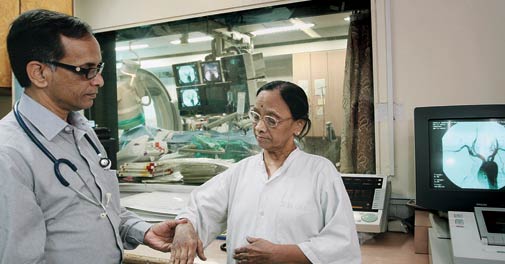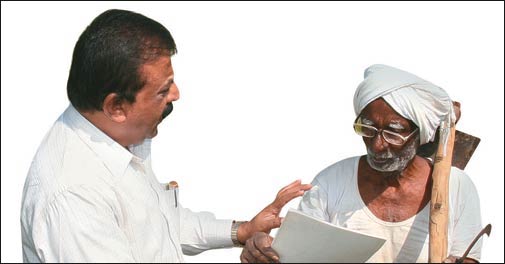
In October, Madrira Ganapathy, a rice and coffee grower in South Coorg, Karnataka, was told by doctors that he had four arterial blocks, all of them above 85 per cent, around his heart. He had to undergo surgery quickly. The following month, he got himself admitted at Fortis Cauvery Heart Hospital in Mysore and underwent surgery successfully.
The operation cost Rs 1.5 lakh but Ganapathy, who earns about Rs 60,000 a year from farming his four acres of land, did not have to pay. Why so? His bill was settled by Yeshasvini Trust, a non-profit organisation under the Karnataka government which runs a micro health insurance scheme for rural folk.
“I am not a BPL (below poverty line) card holder but, at the same time, I could not have afforded a surgery like this. The scheme is of big help to people like me,” says Ganapathy, 48, who has been part of Yeshasvini for five years. “I am now asking my friends also to enrol in the scheme.”

Yeshasvini was launched in June 2003 and now covers about three million people in the state. It is open to all income groups in rural areas, provided the applicant has been a member of any cooperative society for at least six months. It costs Rs 210 a year per family member and covers 805 surgeries in 446 network hospitals.
The hospitals offer medical consultation for free and diagnostic facilities at a discount. In cases involving hospitalisation, the trust clears the bill via a third party administrator. In 2011/12, Yeshasvini Trust settled bills worth Rs 60.27 crore against 77,738 surgeries.
Besides, as many as 116,000 people were treated as outpatients. Since the scheme’s inception, the trust has paid Rs 412 crore for 469,000 surgeries. “We expect the outgo to hospitals to be around Rs 90 crore in 2012/13 because of the increase in hospital charges from April 1,” says Yeshasvini Trust CEO R.M. Nataraja. The trust is largely self-funded – it will mobilise about Rs 60 crore in premiums this year while the government pays Rs 40 crore.
“Yeshasvini is the first insurance programme in the world to coin the term micro health insurance, and its success is because poor people trust only the government,” says eminent heart surgeon Dr Devi Prasad Shetty, Chairman of Narayana Hrudayalaya, and a member of Yeshasvini Trust. “This is the greatest advantage the government enjoys as a large scale health insurance provider.”
The biggest success of Yeshasvini, however, is in proving that, with just about Rs 17 per person a month, it is possible to run a massive, sustainable health insurance programme. “Yeshasvini has demonstrated a model that works with the willing participation of the beneficiaries,” says G.V. Krishna Rau, Chairman of the trust, and Principal Secretary, Department of Cooperation, Karnataka. “The challenge now is to take this forward by enlarging its scope and making it a universal scheme.”
The model has inspired other states such as Tamil Nadu and Andhra Pradesh to start similar programmes. In April 2008, the Centre launched the Rashtriya Swasthya Bima Yojana, a health insurance scheme for BPL card holders which covers costs up to Rs 30,000. In late 2011, the Maharashtra government introduced the Rajiv Gandhi Jeevandayee Arogya Yojana covering about 490,000 people in eight districts.
According to programme officer Mukesh Mohode, the Maharashtra government paid a premium of Rs 180 crore to Kolkata-based National Insurance Company for coverage of these districts. The scheme provides a family floater cover of Rs 1.5 lakh a year covering 972 procedures, including cancer treatment. For kidney transplants the scheme provides up to Rs 2.5 lakh. The scheme, unlike the Yeshasvini plan, is fully funded by the state government and the beneficiaries do not have to pay any premium. Maharashtra aims to extend the scheme to all districts in two to three months.
While the Yeshasvini plan is for rural families, the Jeevandayee scheme benefits both BPL and above poverty line (APL) people (but only up to those with a maximum income of Rs 1 lakh a year) in urban areas as well. One of its recent beneficiaries is Sadhna Dattaram Sawant, a 71-year-old widow who lives in Mumbai’s Parel with her son who does not hold a regular job. She holds an orange ration card, given to people with annual income below Rs 1 lakh. Sawant had been suffering from kidney and cardiac ailments and needed a renal angioplasty to help increase blood supply to her left kidney. This would help solve her hypertension and reduce chances of a heart attack.
On November 26, doctors at the King Edward Memorial (KEM) hospital, run by the Brihanmumbai Municipal Corporation, conducted Sawant’s angioplasty. Sitting on her hospital bed the following day, wearing a hospital-issued white dress, Sawant looked happy. “I thought I would be lying in bed for a long time. I am so happy I am able to walk around a day after the procedure,” she said.
Sandhya Kamath, Dean at KEM, says the hospital has so far handled about 1,700 cases under this scheme. Hemant Deshmukh, the doctor who conducted Sawant’s procedure, says his department alone takes up at least seven or eight similar cases under the scheme every month. “The procedure would have cost Rs 50,000 at King Edward and Rs 1 lakh at a private hospital,” he says. “Under the scheme, the cost to the patient is zero.”
source: http://www.businesstoday.intoday.in / Business Today / Home> Archives> Business Today> Cover Today / by K.R. Balasubramanyam and Sumar Layak / January 06th, 2013

